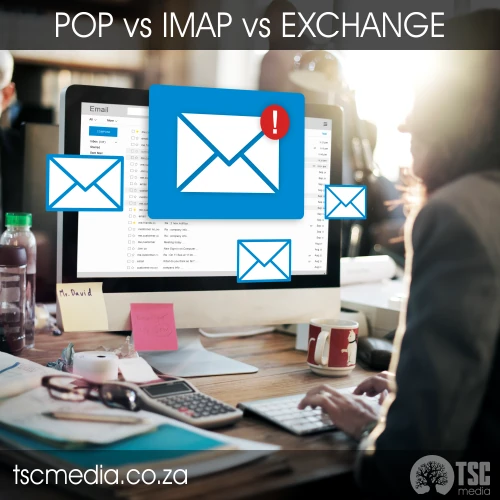Choosing how your email is set up can affect how easily you access your messages, how much hosting space you use, and how safe your data is if your computer crashes. This guide explains the difference between POP, IMAP and Exchange emails and helps you decide which one works best for your needs.
Understanding POP, IMAP and Exchange Emails
Email accounts can be set up in different ways. Each type of setup stores and manages your messages differently. Some options store everything online so you can access your emails from multiple devices. Others save emails directly to your computer and use very little hosting space.
IMAP: Syncs Across All Devices
IMAP is the most common setup for businesses and anyone who checks email from more than one device. It keeps all your emails stored on the server, which means you can access your messages from your phone, laptop or desktop and see the same inbox and folders on all of them.
Benefits of IMAP:
- Emails stay online, so you can access them anywhere.
- Changes made on one device (like deleting or moving an email) are seen on all devices.
- If your computer or phone crashes, your email is still safe on the server.
POP: Saves Emails to Your Device
POP is better for users who check their email from one device only. This setup downloads emails from the server to your computer or phone and then usually removes them from the server. That means less space is used on your hosting account.
Things to keep in mind:
- Emails are stored only on your device.
- If your device crashes or is lost, the emails may be gone unless you’ve backed them up yourself.
- You cannot see the same inbox on multiple devices because each device downloads separately.
Exchange: Cloud Email That Saves Hosting Space
Exchange email works a bit like IMAP but with added benefits. It stores all emails, contacts and calendars in the cloud. It syncs instantly across all devices and does not use your website hosting space. This makes it ideal for business users, especially teams that need shared inboxes or calendars.
Why consider Exchange:
- All email data is stored online and kept safe if your device fails.
- Works well across multiple devices.
- Saves space on your hosting account because nothing is stored there.
Important to note:
An Exchange email account is a separate service with its own cost. This is billed separately from your website hosting.
If you want Exchange email for addresses that use your own domain (like
Which Email Setup Is Right for You?
IMAP
Where emails are stored: On the server
Best for: Syncing email with multiple devices
Hosting space used: Uses space on hosting
POP
Where emails are stored: Locally on your device
Best for: Single-device access
Hosting space used: Saves space on hosting
Exchange
Where emails are stored: In the cloud
Best for: Syncing calendar, contacts and emails across devices
Hosting space used: No space used on hosting
Not Sure Which to Choose?
If you're not sure which setup is right for you, we are here to help. Whether you're managing emails on your own or setting up accounts for a growing team, we can make sure your hosting plan suits the email setup you need.
Reach out to us for guidance tailored to your business needs.
Helpful Resources
Here are some useful guides to help you manage your email and hosting more effectively:


